In this article, we take a deep dive into the Ethiopian coffee industry, exploring its history, significance to the nation’s economy, and key players in the market. We also examine the various challenges faced while exporting Ethiopian coffee, including political, legal, logistical, infrastructural, and economic issues. Furthermore, we address the quality control measures, certification, and compliance standards associated with Ethiopian coffee. Finally, we identify the potential strategies for overcoming the export barriers and enhancing the growth of this vital industry.

The Ethiopian Coffee Industry
History of Coffee in Ethiopia
Ethiopia is often considered the birthplace of coffee, with the discovery of the coffee plant dating back to the 9th century. According to legend, a goat herder named Kaldi first discovered the coffee plant when his goats became energized after consuming the red berries from the plant. The story goes that Kaldi, curious about the effects of the berries, tried them himself and felt a boost in his energy, which led to the eventual cultivation of the coffee plant.
In the centuries that followed, coffee consumption spread throughout the Ethiopian Empire as well as neighboring countries. In the 15th century, coffee beans were first exported from Ethiopia to Yemen, where they started to be cultivated for trade. From there, coffee made its way to the Arabian Peninsula and Ottoman Empire, eventually reaching Europe in the 17th century.
Today, the coffee plant is still a significant part of Ethiopian culture, with traditional coffee ceremonies playing an essential role in social and community life. Coffee ceremonies often involve the roasting of coffee beans, grinding them by hand, and brewing the coffee in a traditional clay pot called a jebena. In Ethiopia, coffee is often consumed with sugar or salt, and occasionally with butter or other spices.
Significance of Coffee to Ethiopian Economy
The coffee industry is one of the main drivers of the Ethiopian economy, contributing significantly to the country’s export earnings, income generation, and employment. Coffee accounts for more than 30% of Ethiopia’s total export earnings, making it the country’s most valuable export commodity.
Ethiopian coffee is recognized worldwide for its quality and unique flavor profiles, attracting coffee enthusiasts and specialty coffee buyers. The industry supports the livelihoods of millions of small-scale farmers, labors, and their families, with over 15 million Ethiopians directly or indirectly dependent on coffee for their income.
Additionally, the coffee industry plays an essential role in Ethiopia’s domestic economy as it provides tax revenue and employment opportunities throughout the value chain, from farmers to processors and retailers. Ethiopia is also one of the few countries with a significant domestic coffee market, with two-thirds of its production consumed within the country.
Furthermore, the Ethiopian coffee industry is fundamental in driving social and environmental initiatives in the country. Many coffee cooperatives and export companies have adopted sustainable and fair-trade practices, supporting community development and environmental conservation in Ethiopia’s coffee-growing regions.
Key Players in Ethiopian Coffee Industry
The Ethiopian coffee industry is composed of various key players, including farmers, cooperatives, processors, exporters, and government institutions. Here are some of the main players in the industry:
- Small-scale farmers: Ethiopia is home to an estimated 4 million small-scale coffee farmers who cultivate coffee on small plots of land. These farmers are responsible for more than 95% of Ethiopia’s coffee production and have vast knowledge and experience in traditional coffee farming methods.
- Cooperatives and unions: Coffee cooperatives play a crucial role in the Ethiopian coffee industry by helping farmers access resources, training, and markets for their coffee. They also work collectively to improve coffee quality and achieve certifications that can command higher prices, such as organic or fair-trade certifications. These cooperatives often join together to form larger unions, facilitating more efficient marketing and negotiation on behalf of their members.
- Processors and exporters: The coffee industry also includes many private processing and exporting companies. These companies provide specialized coffee processing services, such as wet and dry milling, as well as working to market Ethiopian coffee to international buyers.
Government institutions: The Ethiopian government plays a crucial role in supporting and regulating the country’s coffee industry. Institutions such as the Ethiopian Coffee and Tea Authority (ECTA) and the Ethiopian Commodity Exchange (ECX) work to promote Ethiopian coffee exports, provide assistance to farmers, and ensure transparency and fair pricing in the industry.
Challenges of Exporting Ethiopian Coffee
Political and Legal Challenges
Ethiopian coffee exporters face numerous political and legal challenges in their efforts to bring the high-quality coffee to international markets. These challenges not only affect the profitability and competitiveness of the industry but also create barriers that limit the growth of the sector as a whole.
-One of the major political and legal challenges faced by Ethiopian coffee exporters is trade barriers. Many countries impose trade barriers in the form of quotas, import licenses, and other regulatory measures to protect their domestic industries. These trade barriers often create hurdles for Ethiopian coffee exporters, who must negotiate their way through complex and time-consuming procedures to obtain approval for their products. Additionally, this often results in higher costs that eat into the profitability of the sector.
-Another significant challenge is import tariffs and restrictions. While some countries have relaxed import tariffs for Ethiopian coffee (mainly due to the Everything But Arms Initiative for the least developed countries), there are still restrictions and duties that Ethiopian coffee exporters must deal with. These tariffs and restrictions can sometimes result in additional costs and make it more challenging for Ethiopian coffee to compete with coffee from other countries that enjoy lower tariff rates or preferential market access.
-Political instability in Ethiopia also poses a challenge for coffee exporters. Civil unrest, protests, and clashes among different ethnic groups have led to disruptions in the supply chain and hampered the movement of goods, including coffee. Moreover, political instability also affects investor confidence and deters foreign direct investment in the Ethiopian coffee sector which could lead to better infrastructure and market access opportunities.
Logistical and Infrastructural Challenges
Ethiopian coffee exporters also grapple with numerous logistical and infrastructural challenges that affect their ability to compete in the global market.
-Transportation and distribution issues are significant challenges facing Ethiopian coffee exporters. The country’s underdeveloped road network and a lack of reliable transportation services make moving coffee from farms to processing centers and export terminals difficult and time-consuming. This often results in delays, increased costs, and lower quality coffee reaching the international market.
-Storage and warehousing is another area where Ethiopian coffee exporters face challenges. The shortage of adequate storage facilities leads to problems such as coffee being exposed to the elements or being damaged by pests, ultimately reducing its quality and market value.
-Exportation procedures and documentation in Ethiopia can also be complex and time-consuming. Obtaining necessary permits, certificates, and attestation of documents often involves multiple government agencies, leading to delays and increased costs for coffee exporters.
Economic Challenges
Several macroeconomic factors pose significant challenges to Ethiopian coffee exporters, affecting the overall competitiveness of the sector in international markets.
-Fluctuating exchange rates pose a significant challenge for Ethiopian coffee exporters, as they affect the profitability of coffee exports. Depreciation of the Ethiopian Birr (ETB) can cause losses for exporters, as they may receive lower returns on their sales in foreign currencies. Conversely, appreciation of the ETB may make Ethiopian coffee less competitive in international markets.
-Access to finance and credit facilities is another significant challenge faced by Ethiopian coffee exporters. Many financial institutions in Ethiopia charge high interest rates on loans, making it difficult for coffee exporters to obtain the necessary funds to expand their operations or enter new markets. Additionally, the lack of adequate credit facilities and financial products tailored to the needs of coffee exporters also hampers the growth of the sector.
-International competition is a crucial challenge facing Ethiopian coffee exporters. Countries such as Brazil, Vietnam, and Colombia are major coffee producers with well-developed infrastructure and market access, making it difficult for Ethiopian coffee to compete on both price and quality. To overcome this challenge, Ethiopian coffee exporters need to focus on improving the quality of their coffee, utilizing niche marketing strategies, and promoting the unique aspects of Ethiopian coffee to carve out a market share in the highly competitive global coffee industry.
Quality and Standards of Ethiopian Coffee

Ethiopia is known as the birthplace of coffee and boasts a rich coffee culture that dates back centuries. Ethiopian coffee is highly valued for its exceptional quality and unique flavor profiles resulting from specific growing regions and processing methods. As demand for premium coffee increases globally, Ethiopia needs to maintain high quality and standards to maintain its position as a top coffee exporter.
Quality Control Measures and Standards
Quality control is a vital aspect of the Ethiopian coffee production process. This includes monitoring coffee cultivation, harvesting, processing, and export to ensure that the final product meets high standards. The Ethiopian Coffee and Tea Authority (ECTA) is responsible for enforcing these standards and implementing measures to encourage ethical and sustainable practices in the industry.
Ethiopian coffee is primarily produced by smallholder farmers who typically own between 0.5 and 2.5 hectares of land, and in some cases, can be organized into cooperatives. To ensure quality, they are required to adhere to specific agricultural practices such as optimal planting, pruning, and constant inspection for pests, diseases, and other issues that may compromise the crop’s quality.
Once harvested, the coffee cherries are sorted and processed. In Ethiopia, processing methods include wet and dry processing. Wet processing, the preferred method for specialty coffee production, involves removing the cherry pulp, fermenting the beans, washing, and then drying them. Dry processing involves drying the cherries directly under the sun before removing the pulp, resulting in a sweet and fruity taste. In both cases, the beans are further sorted by density, size, and color to ensure that only the best beans make it to the next stage.
Before coffee beans are exported, they undergo a grading system introduced by the ECTA to assure the quality of Ethiopian coffee. Coffee is graded on a scale from 1 (highest quality) to 9 (lowest quality), taking into consideration factors such as bean size, defects, and cup quality.
Certification and Compliance
To appeal to international markets, Ethiopian coffee often undergoes additional certification and compliance procedures, such as Fair Trade and Organic Certification.
Fair Trade Certification focuses on ensuring that coffee growers receive a fair compensation for their products while promoting sustainable farming practices. This certification aims to create transparency, reduce poverty, and promote environmentally friendly practices in the coffee industry. Fair Trade certified Ethiopian coffee often attracts a premium price in the market, which helps support smallholder farmers.
Organic Certification, on the other hand, focuses on the use of natural inputs and prohibits the use of synthetic chemicals, genetically modified organisms, and radiation. This certification ensures that the coffee is grown and processed in an environmentally friendly way, which contributes to the overall quality and sustainability of Ethiopian coffee production.
In addition to these certifications, Ethiopian coffee also needs to comply with international standards such as the EU, US FDA, and Japan Food Sanitation Law. These standards set strict criteria on chemical residues, contaminants, and microbiological quality to ensure that imported coffee meets the safety standards of the destination countries.
Consumer Preferences and Market Trends
A significant factor that affects the quality and standards of Ethiopian coffee is the changing preferences of international consumers and the global market trends.
Specialty coffee, which refers to coffee grown in ideal climates and processed with care to reveal distinct and unique flavors, has been gaining popularity across the globe. Ethiopian coffee, known for its distinct flavor profiles such as fruity, floral, and earthy notes, is well-positioned to cater to this niche market. By focusing on quality and differentiation, Ethiopian coffee producers can capture a higher market share in the specialty coffee industry.
Another factor impacting Ethiopian coffee is the changing preferences of international consumers. With a growing awareness of ethical and environmentally sustainable practices in coffee production, consumers are increasingly looking for brands that prioritize social and environmental responsibilities. By adhering to strict quality and certification standards, Ethiopian coffee can continue to be an attractive option for conscious consumers.
In conclusion, the quality and standards of Ethiopian coffee are vital in maintaining its position as a premium product in the global market. By implementing strict quality control measures, adhering to certification and compliance standards, and adapting to evolving consumer preferences and market trends, Ethiopian coffee can continue to thrive and grow as a cherished and sought-after commodity.
Strategies for Overcoming Export Challenges
Export challenges can significantly hinder a company’s potential for growth and success in the international market. However, there are several strategies that businesses can adopt to overcome these hurdles and capitalize on the many opportunities available. In this article, we will discuss five key strategies, focusing on the Ethiopian coffee industry as a case study.
Improving Infrastructure and Distribution Networks
Efficient infrastructure and distribution networks are fundamental for export success. In Ethiopia, the coffee industry faces numerous logistical issues due to the country’s inadequate transportation systems, high freight costs, and lengthy bureaucratic procedures. To address this challenge, both the government and businesses should invest in the improvement of road, rail, and transportation infrastructure to ease the movement of goods from farms to ports.
Additionally, streamlining customs clearance processes and modernizing ports can be crucial in reducing delays and ensuring timely delivery of coffee to international buyers. For instance, the Ethiopian government can implement electronic data interchange (EDI) systems and simplified documentation requirements to enhance the efficiency of customs clearance for coffee exporters.
Developing Effective Export Marketing Strategies
An effective export marketing strategy is vital for the success of any business seeking to penetrate international markets. Coffee exporters in Ethiopia should consider conducting comprehensive market research, identify potential target markets and develop suitable strategies tailored to the preferences and tastes of consumers in those regions. This approach will increase the chances of Ethiopian coffee being well-received in various international markets.
Moreover, trade promotion agencies and government bodies can support Ethiopian coffee exporters through organizing international trade shows, exhibitions, and workshops to showcase the country’s unique coffee products. These platforms provide opportunities for businesses to establish connections and open doors to new business prospects.
Building Strong Relationships with International Buyers
Establishing and maintaining strong relationships with international buyers is essential for long-term export success. Ethiopian coffee exporters should invest in building trust and fostering mutually beneficial partnerships with their buyers, ensuring reliable communication and timely delivery of products.
Attending international trade shows and events can enable Ethiopian coffee exporters to meet potential buyers, negotiate contracts and learn about market trends. Additionally, utilizing online marketplaces and platforms like Alibaba, Amazon Business, and Global Sources, can offer opportunities to connect with potential buyers and showcase their products to a global audience.
Enhancing Quality and Consistency of Ethiopian Coffee
Ethiopian coffee has long been renowned for its rich flavors and unique attributes. However, maintaining high quality and consistency in the production and processing of coffee beans is critical for attracting and retaining international buyers. Ethiopian coffee producers should implement strict quality control measures at every stage of the production process, from planting to harvesting, processing, and packaging.
Coffee coop unions, government bodies, and trade associations can collaborate to provide training, technical assistance, and financial support to coffee farmers to enhance their skills, modernize production techniques, and ensure consistency in the quality of Ethiopian coffee exported.
Exploring New Market Opportunities

While Ethiopia has traditionally focused on exporting coffee to Europe and the United States, there are numerous opportunities available in emerging markets like Asia, the Middle East, and Africa. Proactively exploring these new market opportunities can help Ethiopian coffee exporters diversify their portfolio and mitigate risks associated with overdependence on a limited number of markets.
To tap into these new markets, exporters should familiarize themselves with local consumption patterns, preferences, and regulations in order to tailor their marketing strategies accordingly. Furthermore, the Ethiopian government can support these efforts by negotiating trade agreements and promoting Ethiopian coffee through diplomatic engagements and trade missions.
FAQs on The Challenges of Exporting Ethiopian Coffee to International Markets
1. What are the logistical challenges of exporting Ethiopian coffee to international markets?
Transportation infrastructure in Ethiopia faces inadequate road networks and limited port access, making transportation of coffee exports difficult. Additionally, bureaucratic processes and a lack of cold storage facilities contribute to these logistical challenges.
2. How do quality control issues affect Ethiopian coffee exports to international markets?
Despite Ethiopia’s high-quality coffee, inconsistencies in flavor profile and grading standards affect global perceptions. Inadequate processing and post-harvest practices can lead to lower quality coffee, impacting Ethiopia’s competitiveness in international markets.
3. Can Ethiopian coffee production keep up with global demand?
While Ethiopia has a high potential for coffee production, climate change, pests, and diseases threaten crop yields. This, along with the small-scale farming and limited resources, makes it difficult to keep up with global demand consistently.
4. How does Ethiopia’s coffee supply chain affect its competitiveness in international markets?
A complex, fragmented, and poorly-regulated supply chain in Ethiopia leads to inefficiencies and a lack of transparency. These factors make it difficult for Ethiopian coffee producers to compete in international markets, where traceability and sustainability are increasingly important.
5. What role does government regulation play in Ethiopian coffee export challenges?
Government policies in Ethiopia impact coffee exportation through export licensing, taxation, and foreign exchange controls. These regulatory measures can be restrictive and create roadblocks in accessing international markets, affecting the competitiveness of Ethiopian coffee.
6. How can Ethiopian coffee producers overcome the challenge of limited access to finance?
Enhancing financial accessibility for small-scale coffee growers in Ethiopia involves improving access to credit facilities, developing affordable insurance schemes, and promoting measures to facilitate savings. Government interventions can play a critical role in enabling this support for coffee producers.